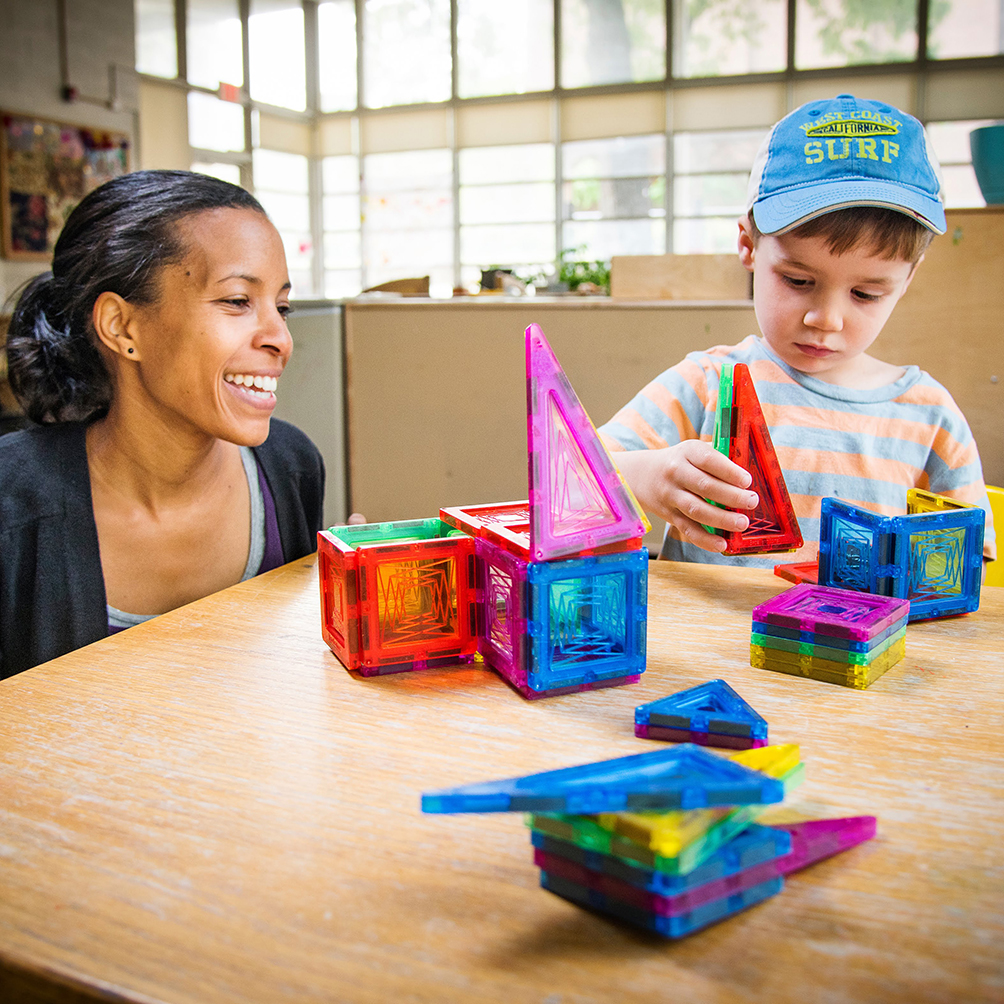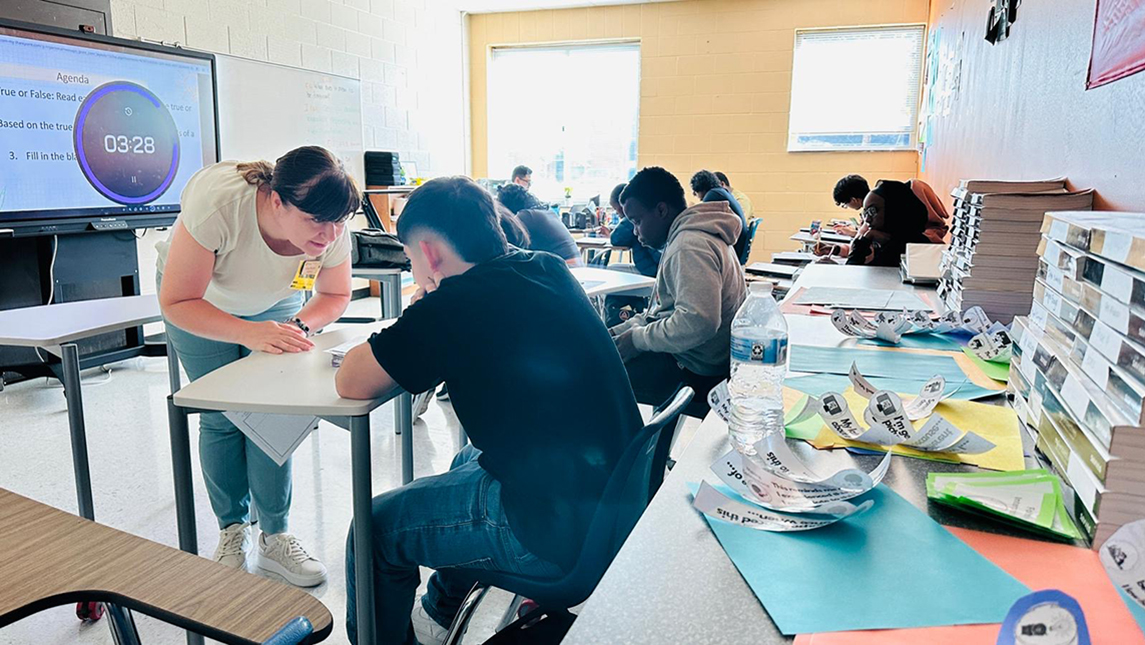Heather Coleman helps families and teachers better understand and communicate with young children.
Parents, each with a Bluetooth device in their ears, sit in a play-based early intervention therapy session with their autistic child. As they interact through a series of exercises, they receive instruction, feedback and encouragement audibly through their earbuds. The voice talking to them is a community-based early intervention professional trained by a team of coaches led by Heather Coleman, UNC Greensboro Assistant Professor in the Department of Specialized Education Services. The goal: support early intervention therapists, who work with families of autistic children to help them better understand and communicate with each other.
Addressing rise in autism
In 2023, the Centers for Disease Control and Prevention reported that 1 in 36 children in the United States have autism. Early diagnosis and intervention could hold the key to addressing communication barriers between children and their caregivers.
“The prevalence of autism continues to grow, and pediatricians are starting to diagnose autism, younger and younger,” Coleman says. “Supporting infant and toddler mental health is really tied to supporting their families.”
Coleman began her teaching career as an early childhood educator while completing her master’s degree. In one of her early teaching jobs working with children ages two through six, Coleman worked in a rural county in Virginia that required home visits each week.
“On Wednesdays, the students didn’t come to school, so we did home visits and worked with their parents, or if they were in a childcare center, we worked with the teachers at that childcare center. That’s when I really started falling in love with parent education and supporting parents. Most of them confessed, “I don’t know what to do” when they ran into a behavior or communication problem. It really inspired my research career.”
Remote research leads to expanded support
Coleman’s grant-funded research projects are hands-on and intimate, meaning she works with a small number of participants to discover what techniques and therapies work best for families. This year, she completed an intense four-month project designed to help support early intervention providers and parents of autistic children by implementing communication support.
“Mental health is a huge factor in supporting children in early childhood. Supporting infant and toddler mental health is really about supporting their parents’ mental health as well.”
Heather Coleman, Assistant Professor in the Department of Specialized Education Services
“We worked with an early intervention provider to understand how she was using telehealth to support a family with an autistic child in the home. We taught her how to use an intervention that really focused on communication,” Coleman says. “We provided the family with what we call a ‘bug in ear’: a Bluetooth device so only the parent could hear the therapist talking. In this way, the child wasn’t distracted by having a therapist in the room, but the parent was still receiving support.”
They found that the technique was easy for the therapist to adapt and implement in the moment. The therapist gave the family short directions to help them communicate with the child, while not audibly interfering. Further, the telehealth method allows the early intervention therapists to serve more families by cutting out travel time, which saves hours each day for therapists who serve rural communities. Coleman is analyzing the data from the four-month research project and hopes it will help augment therapies that can be applied remotely to families and interventionists.
“We hope to develop virtual practices, and support therapists in how best to use them to reduce cost, travel time and ultimately reach more families,” Coleman says. Though widely implemented during the Covid-19 pandemic, virtual therapies may also be applied to rural counties where access to interventions is limited due to distance and access barriers.
Training for early childhood education professionals
In addition to her research efforts, Coleman has worked in North Carolina with the Autism Collaborative in Mecklenburg County and trains early childhood teachers in Guilford County. At UNCG, Coleman supervises undergraduate and graduate students working towards degrees in specialized education services, birth to kindergarten, and are pursuing their own research.
In 2021, three of her students received Undergraduate Research and Creativity Awards and partnered with Coleman to advance their understanding of early childhood education and how parents interact with their autistic children. This semester, Coleman is working with undergraduate researcher Melissa Cleary, also a URCA recipient, to include infant and early childhood mental health competencies in the curriculum.
“I’m in partnership with the North Carolina Alliance for the Advancement of Infant Mental Health (NCIMHA) on a project to support our graduate certificate program in Leadership in Infant and Toddler Learning (LITL),” Coleman says. “The LITL program was originally funded by the NC DHHS Division of Child Development and Early Education. With the new grant, Cleary and I want to make sure that the program involves mental health competencies in emotional, cognitive, and social capacities for a healthy future.”
Ensuring these mental health competencies are part of the graduate certificate program will help strengthen the students’ knowledge and support the development of an effective workforce in early childhood education classes and programs.
“Mental health is a huge factor in supporting children in early childhood,” Coleman says. “Supporting infant and toddler mental health is about supporting their parents’ mental health as well. We are training our early childhood providers to support regulation in children, and it’s a huge need, especially coming out of the pandemic. A lot of these children have never been to school or lost two years of learning. We must support parents through this, as well as the children.”
The new curriculum for LITL provides an opportunity for educators and interventionists to augment their practice in the field with in-depth knowledge of infant-toddler mental health development. Jointly offered by UNCG’s Human Development and Family Studies and Specialized Education Services faculty, it also provides course work that aligns with requirements needed to earn the North Carolina Infant-Toddler Mental Health Endorsement, a credential offered by the NCIMHA.
“Once the LITL program is fully aligned, it will be a great resource for early childhood teachers and professionals to come back and learn more about infant and toddler learning and mental health,” Coleman says. “Our program is fully online, so we are excited to reach professionals across the state and the country.”
Story by Alice Manning Touchette
Photography by Sean Norona, University Communications




